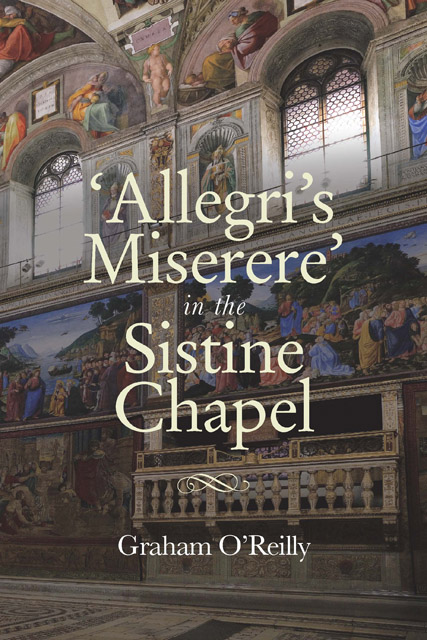Book contents
- Frontmatter
- Contents
- List of illustrations
- List of tables
- List of music examples
- Acknowledgments
- Note on the text
- Introduction: myth and reality
- Part One The Sixteenth and Seventeenth Centuries
- Part Two The Eighteenth Century
- Part Three The Nineteenth Century
- Part Four Performing the Miserere in the Twentieth Century
- Part Five Appendices, Editions and Notes
- List of appendices
- Bibliography
- Index
- Frontmatter
- Contents
- List of illustrations
- List of tables
- List of music examples
- Acknowledgments
- Note on the text
- Introduction: myth and reality
- Part One The Sixteenth and Seventeenth Centuries
- Part Two The Eighteenth Century
- Part Three The Nineteenth Century
- Part Four Performing the Miserere in the Twentieth Century
- Part Five Appendices, Editions and Notes
- List of appendices
- Bibliography
- Index
Summary
Throughout the eighteenth and nineteenth centuries, visitors flocked to Rome in Holy Week to hear the amazing Miserere. Descriptions such as the following are typical of their reactions:
There can never have been music with so natural harmonies so delightfully heard as this Miserere … It was accompanied by no instruments but is so full and so melodious that it cannot be imitated by anybody just from the score … in the twilight of the evening as the lights are being put out, in a solemn silence unusual for Italians, this song of lamentation starts. On hearing these melodious tunes, one forgets the earth and is drawn from time to eternity, and can imagine one is hearing the choirs of the saints. (Anonymous, 1783)
No music makes such an impression on the heart, none other has such profound effects such as the old masters used to say music should have, nor brings the soul to such a feeling of deepest trembling … as this Miserere. What one feels with this music, and must feel, nobody in the world has yet felt … This music is unique of its kind. (Carl Ludwig Junker, 1784)
They who have assisted at the office of Tenebrae will not be surprised at the saying of a philosopher, that for the advantage of his soul he would wish that when he was about to render it up to God, he might hear sung the Miserere of the Pope’s chapel. (Charles Michael Baggs, 1839)
But a thousand times over I would go to listen to the Miserere in the Sistine Chapel; that spot made sacred by the most sublime works of Michael Angelo … The music, not only of the Miserere, but of the Lamentations, is solemn, pathetic, religious – the soul is rapt – carried away into another state of being. Strange that grief, and laments, and the humble petition of repentance, should fill us with delight – a delight that wakens these very emotions in the heart – and calls tears into the eyes, and yet is dearer than any pleasure. (Mary Shelley, 1840)
There are innumerable similar statements. Valuable accounts were left by Mendelssohn, Spohr, Nicolai, Herold, Gounod, Liszt and Berlioz, not to mention Goethe, Stendhal, Chateaubriand, Ingres and Germaine de Staël. As the testimony of Cramer and Shelley suggests, it was not just the music that impressed the listeners, but the context.
- Type
- Chapter
- Information
- Allegri's Miserere in the Sistine Chapel , pp. 55 - 70Publisher: Boydell & BrewerPrint publication year: 2020



